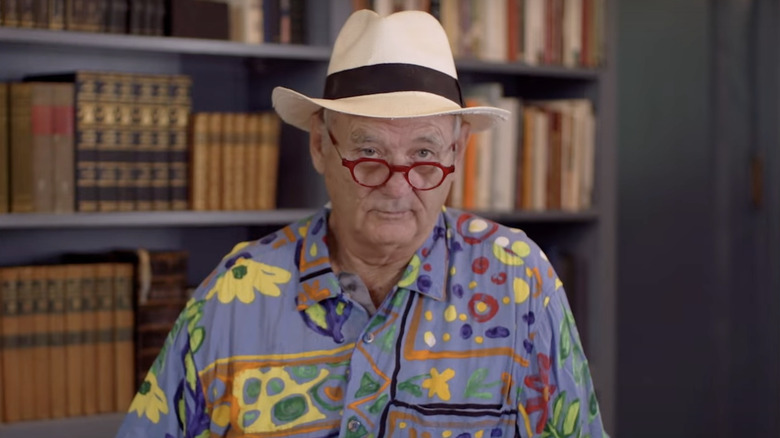Bill Murray Goes Full French Dispatch, Reads Wolcott Gibbs' Rules For New Yorker Editors
If you want to receive tips from a New Yorker editor and watch Bill Murray drink himself to sleep while promoting "The French Dispatch," then this is your lucky day. In the new movie from director Wes Anderson, Murray portrays Arthur Howitzer Jr., the editor of the eponymous "French Dispatch" magazine. His character is based on Harold Ross, co-founder of The New Yorker, while Owen Wilson's character, Herbsaint Sazerac, is based on Joseph Mitchell, a writer for that same magazine.
Sure, Murray could be going Marvel, appearing in "Ant-Man and the Wasp: Quantumania." But sorry, Charlie: we all know his real passion isn't that, or even ghost-busting like he did when he was young and full of pepper (or, uh, sedatives, which his "Ghostbusters" character, Peter Venkman, happens to bring along with him on his dates for some reason).
No, kids, Murray's real passion is working with Wes Anderson, whose fictional French city of Ennui-sur-Blasé does rather sound like a sedative or a place where you might drink yourself to sleep. Murray has appeared in all nine of Anderson's films since "Rushmore." The only Anderson film that doesn't feature Murray is his indie first feature, "Bottle Rocket."
Anderson, as it turns out, is a New Yorker fan, which is why Murray is promoting "The French Dispatch" this way, by reading old editing rules, written decades ago.
"Morosely, Violently, Eloquently" Yours
Some of the rules that Murray lays out in the above video are:
- Writers use too many damn adverbs.
- Our writers are full of clichés.
- Pieces about authors, reporters, poets, etc. are to be discouraged in principle.
I hope no one's reading this, thinking, "Ha, ha, ha! You just described yourself, /Film." The joke is, Anderson is breaking these rules in "The French Dispatch," which features a star-studded cast that includes Benicio del Toro, Adrien Brody, Tilda Swinton, Léa Seydoux, Frances McDormand, Timothée Chalamet, Lyna Khoudri, Jeffrey Wright, Mathieu Almaric, and Stephen Park. You can also glimpse Henry Winkler in the video above.
For what it's worth, some of us writers do find ourselves counting adverbs, trying to remove "morosely, violently, eloquently" unnecessary ones. This is by no means limited to the literati of New York. It's even something that Robert McKee encouraged in "Story," one of the foundational books that many Hollywood screenwriters have used to hone their craft. He said, "To write vividly, avoid generic nouns and verbs with adjectives and adverbs attached and seek the name of the thing."
"Vividly" is an adverb, but the name of the thing, in this case, is "The French Dispatch," and it's in theaters now.
THE FRENCH DISPATCH brings to life a collection of stories from the final issue of an American magazine published in a fictional 20th-century French city.
